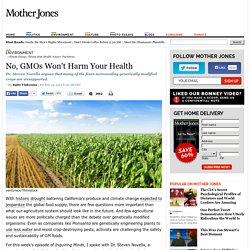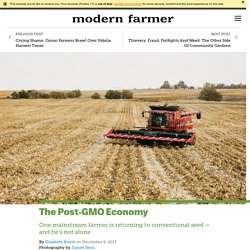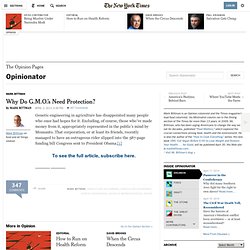

Le désherbant Roundup classé cancérogène. LE MONDE | • Mis à jour le | Par Stéphane Foucart Parmi les trois molécules réévaluées par le CIRC se trouvent deux insecticides, le diazinon et le malathion, dont l’utilisation est restreinte en Europe.

C’est la troisième substance épinglée, le glyphosate, qui donne son caractère singulièrement explosif à l’avis rendu par le CIRC. Synthétisé par Monsanto dans les années 1970, le glyphosate – principal ingrédient du célèbre désherbant Roundup – est en effet l’herbicide le plus utilisé au monde et le plus souvent retrouvé dans l’environnement. « Il est utilisé dans plus de 750 produits pour l’agriculture, la foresterie, les usages urbains et domestiques, notent les scientifiques réunis par le CIRC. Son utilisation a vivement augmenté avec le développement des cultures transgéniques tolérantes au glyphosate. » Ce n’est donc pas une simple substance chimique dont l’innocuité est mise en cause par le CIRC, mais la pierre angulaire de la stratégie du secteur des biotechnologies. U.S. foods labeled 'natural' often contain GMOs, group reports.
Le Vermont veut étiqueter les aliments qui contiennent des OGM. La Chambre des représentants du Vermont a adopté une mesure en ce sens mercredi soir, environ une semaine après que le Sénat ait fait de même.

Le gouverneur Peter Shumlin a indiqué avoir l'intention de l'entériner. Le nouvel étiquetage entrera en vigueur le 1er juillet 2016, ce qui donnera suffisamment de temps aux producteurs alimentaires pour s'y conformer. Une trentaine d'autres États américains planchent sur des mesures similaires. Plusieurs sondages ont démontré que les Américains sont très majoritairement favorables à l'étiquetage des aliments qui contiennent des OGM, tandis que le puissant lobby agroalimentaire y voit une initiative coûteuse et inutile.
GM maize, health and the Séralini affair: Smelling a rat. GENETICALLY modified maize causes cancer: that was the gist of one of the most controversial studies in recent memory, published in September 2012 by Food and Chemical Toxicology.

Well, actually, it doesn’t. On November 28th the journal retracted it. This followed criticism that the rats used in the experiment were prone to cancer anyway; that the experimental protocol used could not distinguish tumours which might have been caused by GM food from those that were spontaneous (it had been set up to investigate a different question, and thus included too few animals); and that the authors offered no mechanism by which GM food could cause cancer. Can This Man Feed the World? Billionaire Harry Stine's Quest to Reinvent Agriculture. Voracious Worm Evolves to Eat Biotech Corn Engineered to Kill It - Wired Science. Corn rootworm on the roots of a corn plant. Image: Sarah Zukoff/Flickr One of agricultural biotechnology’s great success stories may become a cautionary tale of how short-sighted mismanagement can squander the benefits of genetic modification.
After years of predicting it would happen — and after years of having their suggestions largely ignored by companies, farmers and regulators — scientists have documented the rapid evolution of corn rootworms that are resistant to Bt corn. Until Bt corn was genetically altered to be poisonous to the pests, rootworms used to cause billions of dollars in damage to U.S. crops. Named for the pesticidal toxin-producing Bacillus thuringiensis gene it contains, Bt corn now accounts for three-quarters of the U.S. corn crop. First planted in 1996, Bt corn quickly became hugely popular among U.S. farmers. By the turn of the millennium, however, scientists who study the evolution of insecticide resistance were warning of imminent problems.
No, GMOs Won't Harm Your Health. Venturecx/Thinkstock With historic drought battering California's produce and climate change expected to jeopardize the global food supply, there are few questions more important than what our agriculture system should look like in the future.

And few agricultural issues are more politically charged than the debate over genetically modified organisms. Even as companies like Monsanto are genetically engineering plants to use less water and resist crop-destroying pests, activists are challenging the safety and sustainability of GM foods. For this week's episode of Inquiring Minds, I spoke with Dr. Steven Novella, a neurologist at Yale University. The Post-GMO Economy. One mainstream farmer is returning to conventional seed — and he’s not alone By Elizabeth Royte on December 6, 2013 Photography by Daniel Shea As an invulnerable tween, Chris Huegerich, the child of a prosperous farming family, wiped out on his motorcycle in tiny Breda, Iowa.

Monsanto recule sur les OGM en Europe. L'amarante Pourrie la Vie des OGM de Monsanto - lespacearcenciel sur LePost.fr (13:35) Peru Bans Monsanto and GMOs. The first time I ever tasted a real tomato, I was in Cusco, Peru.

I had picked them up at a Farmer’s Market, bought them from an old lady with wizened wrinkles and sun-browned skin. She’d carried a basket of them to market on foot from her scrap of land somewhere far down the mountain. It was a revelation — heaven and sunlight on my tongue! I never knew tomatoes could pack such flavor. I fell in love with the country and it’s people, the Quechua indians who are the remnants of the once proud Incas. Thanks to the indomitable spirit of that people, a ten-year ban on GMOs takes effect this week in Peru! Stephanie Whiteside reports, Peru’s ban on GMO foods prohibits the import, production and use of genetically modified foods.
The victory is a long time coming. The decree banning GMO foods was drafted in 2008. A study done in April of 2011 by the Peruvian Association of Consumers and Users (ASPEC) tested 13 products purchased in major supermarkets and shops in Lima, Peru. Why Do G.M.O.'s Need Protection? Genetic engineering in agriculture has disappointed many people who once had hopes for it.

Excluding, of course, those who’ve made money from it, appropriately represented in the public’s mind by Monsanto. That corporation, or at least its friends, recently managed to have an outrageous rider slipped into the 587-page funding bill Congress sent to President Obama.[1]